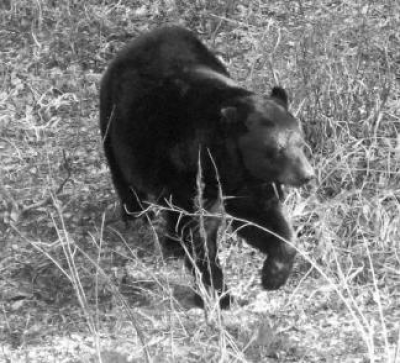Stay Away from the Black Bear!
Eliminate Food Sources that Attract Bears
Remember, in the State of Florida it is illegal to feed Bears. There are no “tame” wild Bears.
If you have problems with Bears, contact
- (888) 404-FWCC (3922) or
- The Regional Office (352) 732-1225
For more information on the Black Bear, please go to FWC/Florida Black Bear
If you encounter a Bear at close range, remain standing upright, back up slowly and speak to the Bear in a calm, assertive voice. Back away slowly and be sure the Bear has an obvious escape route. Walk calmly towards a building or vehicle and get inside. Often the Bear is simply passing through the area and, not finding food, will move on.
Avoid direct eye contact. Bears and many other animals may view eye contact as aggressive behavior. Don't 'play dead' or turn your back on the Bear. Stop. Hold your ground if your movement away seems to irritate the Bear. Don't run. Bears can run up to 35 miles per hour. Don't climb a tree. Bears can climb 100 feet up a tree in 30 seconds!
Encourage the Bear to leave. FWC does not consider it to be a violation of the Bear Rule to scare a Bear off your property by yelling, banging pots and pans, using an air horn or whistle, or honking a car horn. You can also use a motion-sensitive device (e.g., Critter Gitter®, ScareCrow®) that displays flashing lights, emits loud noises, or deploys a spray of water when something approaches the device.
If a Bear is in a tree, leave it alone. Remove people and dogs from the area. The Bear will usually come down and leave after dark when it feels safe. While there have been no predatory Bear attacks on people in Florida, people have been bitten and scratched by Bears defending themselves, cubs, or food sources. If the Bear paws the ground, huffs and puffs, clacks and snorts, or runs directly at you, he is uncomfortable and is trying to scare you off. If you stand your ground, the Bear will likely stop and move away. Truly predatory or aggressive Black Bears are eerily silent. No matter what happens, do not run away. Continue slowly backing away, talking and holding up your arms. The Bear may charge or vocalize several times until he is comfortable turning his back on you and leaving.
If a black bear attacks you: fight back aggressively. People in other states have successfully fended off Black Bear attacks using rocks, sticks, backpacks, water bottles, or even their bare hands!
Preventing access to food is the most important thing you can do to keep Bears wild and out of your neighborhood.
- Feed pets indoors or bring in dishes after feeding - Bears can smell food from 1 mile away.
- Garbage cans and barbeque grills (cleaned) should be stored securely.
- Put out garbage on the morning of pickup rather than the night before.
- Ensure the trash can lid is secure!
- Remove wildlife feeders if there is a Bear in the area. Protect gardens, apiaries, compost & livestock with electric fencing. If you have an apiary or a chicken coop you can acquire electric fencing that is available at any local hardware store or look for specialty stores that sell bear deterrent materials. The mild shock should discourage Bears from pursuing their activity.
- Pick ripe fruit from trees and remove fallen fruit from the ground.
A Fed Bear is a Dead Bear.. Tips for Living in Bear Country
Bear Rule: You are not allowed to “take” a Bear. The Bear Rule relies on the definition of take in Rule 68A-1.004, F.A.C., which includes pursuing, hunting, molesting, capturing, or killing, or attempting those actions, whether or not such actions result in possession of the Bear. In addition to take, Rule 68A-4.009, F.A.C., generally prohibits anyone from possessing, injuring, shooting, wounding, trapping, collecting, or selling Bears or their parts or attempting to engage in such actions without prior authorization from FWC.
Penalties for violating the Bear Rule: Violation of the Bear Rule is a misdemeanor, which can result in fines up to $500 and/or 60 days in jail for a first offense. Prior offenses can result in higher penalties, with imprisonment up to 1 year, a fine of up to $1000, and suspension of recreational hunting & fishing licensing privileges.
A plan for long-term conservation of the Florida black bear, whose population is estimated at more than 3,000 today, compared with as few as 300 in the 1970s, was approved June 27, 2012 by the Florida Fish and Wildlife Conservation Commission:
If you have problems with Bears, call the FWC Regional Office at 1(352) 732-1225 or the Florida Fish and Wildlife Conservation Commission at 1 (888) 404-3922. For more information on the Black Bear, please go to FWC's website.

